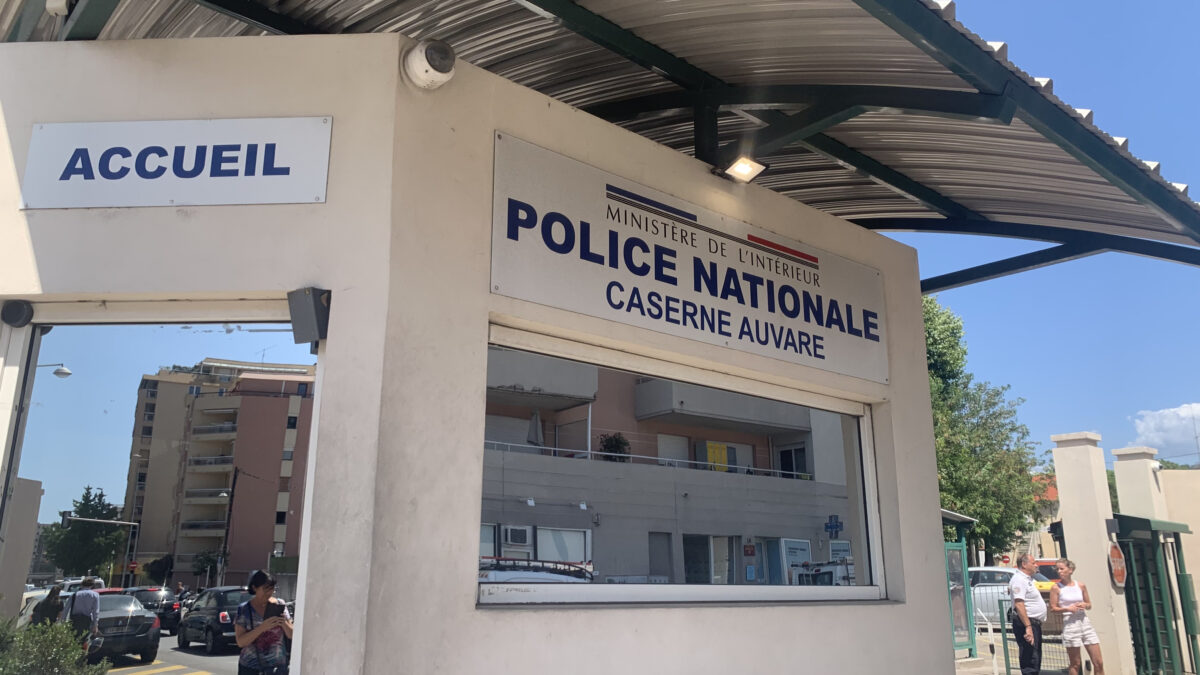On July 26, the national police officers from the Auvare barracks in Nice took the initiative to gather in support of their colleague from Marseille. The protest movement is supported by the Unité SGP Police 06 union, which is calling for a “work-to-rule” strike.
The protest movement continues among the ranks of the police force in Nice. On July 26, around noon, there was a crowd in front of the Auvare barracks located in the Saint-Roch district. At the initiative of the investigation department officers themselves, a gathering was held to express their general dissatisfaction. Officers from all departments wanted to show solidarity with the Marseille police by gathering during their lunch break.
Laurent Martin de Fremont, the local representative of the UNITE SGP police union, describes it as a “unique” situation specific to Nice, as the initiative for this gathering is not within a union framework.
The pre-trial detention of the Marseille officer accused of intentional violence during the night of riots from July 1 to 2, on a young man, is seen as the last straw for the police, the one that overfills the cup of unease and anger. Frédéric Veaux, the director general of the national police, made a rare and notable remark. “Before a possible trial, a police officer does not belong in prison,” he stated.
This protest movement also follows the pre-trial detention of the officer involved in the death of Nahel. More recently, it is the requalification of an investigation from “attempted murder on public authority figures” to “violence” and “refusal to comply” that increases the anger among the police in Nice. These closely timed judicial decisions are the catalyst for this protest.
An impression of “presumption of guilt”
“We are not cowboys, and certainly none of us wakes up in the morning saying ‘I’m going to shoot someone.’ When a shot is fired, it is unintentional. I pray every day to never have to use my weapon,” assures an officer from the Departmental Security.
These cases have intensified the existing tension with the judiciary. “We have a real problem with a good number of magistrates,” admits Laurent Martin de Fremont. Seen as “unjust,” the pre-trial detentions of their colleagues are not well accepted by the witnesses interviewed anonymously at noon. For them, they were not necessary. “Pre-trial detention is used when the person risks escaping, pressuring witnesses, victims, or if there is collaboration, it’s very easy to verify,” shares a disheartened officer.
This impression that there is a “presumption of guilt” for law enforcement is what motivated people to mobilize at noon. “That the President of the Republic condemns us without a trial, that’s not normal. The presumption of innocence applies to everyone, but apparently not to us,” he laments. “We ask not to be treated as second-class citizens,” he adds.
“We are not above the law, that’s clear, but we are not below it either. We need magistrates who work on cases of so-called police violence but who know our daily work well,” demands an officer. In her view, it is about properly establishing the distinction between legitimate and illegitimate violence.
Sick leave or code 562 as a sign of protest
On Tuesday, July 25, the Moulins police station had to close its doors due to insufficient staffing, and it reopened today. The station in Ariane is still experiencing significant staffing difficulties. Laurent Martin de Fremont estimates that “around a hundred,” or 10% of the total police force in Nice, are on sick leave. During the day, a quarter of the officers are on sick leave, according to him. And on Wednesday, July 26, he estimates that only one police patrol is on the road out of the usual fifteen. Those who have not put away their uniforms are trying to apply “code 562” at the unions’ call since last Friday.
Code 562 is a signal inviting officers to assume a standby position and do the bare minimum according to their assigned missions. In principle, they take no initiative and only respond to emergency calls. “We prioritize urgency,” summarizes Laurent Martin de Fremont. Since police officers do not have the right to strike, this is a way for them to slow down as a sign of disapproval.
Laurent Nuñez, the Paris police prefect, calls on his agents to “consider the damage it would do if they ventured to neglect public service” in a letter addressed to them. “The administration is necessarily a bit constrained because there is a public service to be carried out, so it is inherently complicated,” comments the union official from the Alpes-Maritimes.
“We can’t do it anymore”
This gathering seems to be just the tip of the iceberg. “We are here in reaction to the incarceration of our colleagues, which is what started it all. But this issue brings everything to the surface: working hours, everyday problems, often working for little gain, fatigue, and lack of staff. We can’t do it anymore,” confides an officer.
“The public needs to know that we are not at all against them, but we can no longer work for them,” she explains. Quantity has replaced quality, which she criticizes.
She assures that being a police officer today is more complicated than a few years ago, notably due to the “pressure of social networks”. Although supportive of the body camera system, she points out the use of smartphones by the public. According to her, the videos claiming to show police violence often do not allow a proper understanding of the situation.


